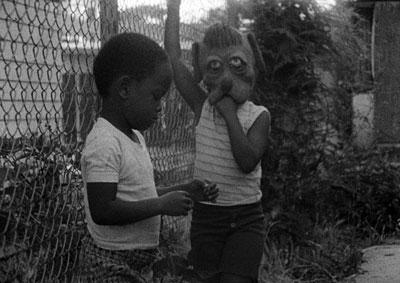Directed by Charles Burnett
Like a slow crescendo, Killer of Sheep became one of L.A. Rebellion’s most widely celebrated films over the course of many years. Its extended 16mm production (completed piecemeal on spare weekends beginning in 1972) led to initial critical acclaim at the Sundance and Berlin film festivals in the early 1980s and acceptance into the National Film Registry in 1990. Although it was restored in 35mm in 2000 by the UCLA Film & Television Archive (using high-tech means that finally gave the original negative its full due), it took seven more years to clear the music rights for commercial distribution. The momentum might have waned if it wasn’t for the gravitational force of filmmaker Charles Burnett’s captivating vision of Watts in post-manufacturing decline, a community heroically finding ways to enjoy and live life in the dusty lots, cramped houses and concrete jungles of South Los Angeles.
The focus is slaughterhouse worker Stan (novelist, playwright and actor Henry Gayle Sanders) whose dispiriting job wears him down, alienates him from his family and becomes an unspoken metaphor for the ongoing pressures of economic malaise. Drawing inspiration from Jean Renoir’s sun-dappled and racially sensitive The Southerner (1945, also restored by the Archive) as well as the poetic documentaries of Basil Wright (one of Burnett’s teachers at UCLA), such as Song of Ceylon (1934) and Night Mail (1936), Killer of Sheep achieves a deeply felt intensity with nonprofessional actors and handheld location shooting. The film also creates a sense of immediacy and spontaneity (though much of Sheep was storyboarded) as well as quiet moments of humor and despair. Burnett finds lyricism by combining quotidian images—children playing on rooftops or Stan and his wife slow-dancing in their living room—with a highly evocative soundtrack of African American music. It’s both a time capsule and a timeless, humanist ode to urban existence. —Doug Cummings
Producer: Charles Burnett. Screenwriter: Charles Burnett. Cinematographer: Charles Burnett. Editor: Charles Burnett. Cast: Henry Gayle Sanders, Kaycee Moore, Charles Bracy, Angela Burnett, Eugene Cherry.
35mm, b/w, 81 min.
Restored from the original 16mm b/w negative A/B rolls and the original 16mm and 35mm magnetic soundtracks by UCLA Film & Television Archive. Laboratory services by Film Technology Company, Audio Mechanics and DJ Audio.






 Mobile Navigation
Mobile Navigation

